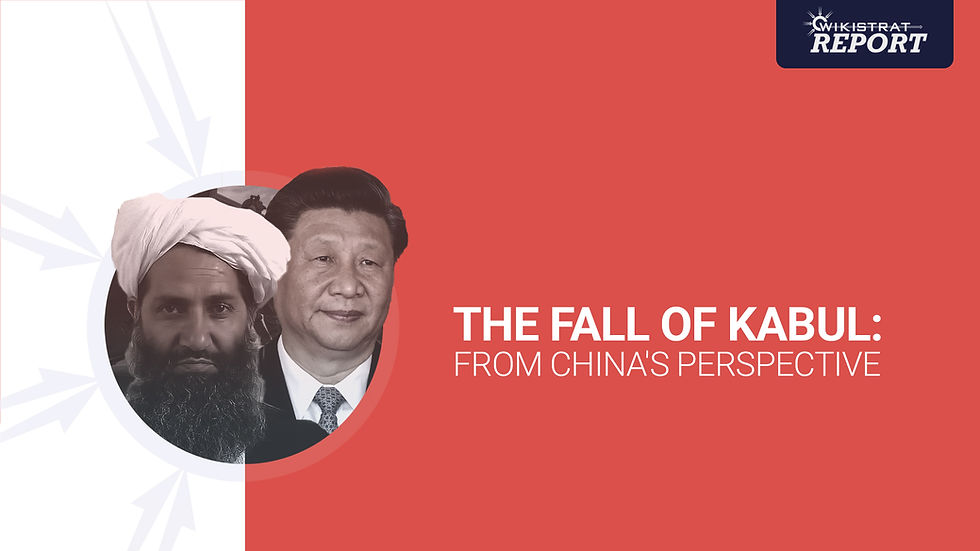Report: The fall of Kabul - From China’s Perspective
- Wikistrat

- Dec 5, 2021
- 3 min read
Updated: Sep 20, 2023
On 15 August 2021, Kabul fell into the hands of the Taliban, completely changing the geopolitical reality in the region. For China, Washington’s chief geopolitical competitor, this situation created both an opportunity and a threat. In September, Wikistrat launched a simulation with over 40 top China and South Asia experts to assess how these events will change China’s policies towards the Taliban, Pakistan, India, and other players in the region.

Read the full report here:
The fall of Kabul to the Taliban on 15 August 2021 is an event that is widely considered a game-changer for the geopolitical balance of powers in South Asia, and one that impacts all neighboring countries. The Taliban’s victory is often viewed as a win for China, Washington’s chief geopolitical competitor, as Beijing has long resented the presence of US troops in what it considers its own backyard.
However, China also had a concern about the reality that could emerge in Afghanistan in the days after the Taliban takeover. Beijing was worried about any instability and political violence that might develop in the country and the impact of such instability on China’s neighboring countries, such as Pakistan, and the Belt and Road Initiative infrastructure projects it had in Afghanistan.
From September 12 to September 14, Wikistrat ran an online simulation with a crowd of 44 experts on China and South Asia to explore the actions of China in Afghanistan and South Asia in response to the rise of the Taliban’s new regime in Afghanistan. The simulation explored the various potential trials and tribulations that could take place under China’s Central and South Asia policies and the further implications of the same in the region.
Read the full report here:
Strategic Insights
China - Taliban:
China’s encirclement of Uighur militants in Afghanistan may backfire violently: It is highly unlikely that China’s request for the extradition of Uighur fighters will be respected by the Afghan Taliban. China’s dependence on the Afghan Taliban for regional security against the local insurgency is also too utopian a dream to actually rely on.
Chinese assistance to the Afghan Taliban is a high-risk, high-reward gamble: The Afghan Taliban could become dependent on China for economic aid, which would create an opportunity for China to improve its trade and security presence in Afghanistan. On the other hand, China’s military presence in Afghanistan and the limitation of US/NATO activities could create a hub for growing regional terrorism.
China - Pakistan:
China and Pakistan may join forces to defend against common violent threats: Pakistan and China are likely to jointly exert pressure on the Afghan Taliban to prevent the flourishing of insurgent groups such as TTP, ETIM, and other militias. The interest of both states lies in protecting the CPEC installations present in sensitive areas.
An independent Chinese agenda may flow in parallel to joint efforts with Pakistan: China might invest in Pakistan’s military and ask for disproportionately higher returns, ranging from keeping anti-Chinese forces at bay to tackling the Afghan refugee crisis. China might also exploit Pakistan’s membership in Troika Plus and the latter’s significant experience with and intelligence about Afghan terror networks.
China - India:
Beijing may box-in New Delhi’s foreign ambitions by forcing on India multiple fronts: The China-Pakistan-Afghan Taliban coalition could exacerbate India’s border tensions, thereby limiting the budget for India’s Afghanistan and regional projects. The growth of terror groups targeting India could also lead India to focus on homeland security, thus leading to India’s isolation from its major partners.
Chinese expansionism may come at the cost of its relationship with India: The China-India relationship could face further strains with growing mistrust. The China-Russia-Pakistan nexus will further diminish India’s Central and Western Asia dreams.
China - Other Actors:
Cooperation may co-exist with rivalry in Beijing-Moscow relations: The Beijing-Moscow coalition might focus on the stabilization of Afghanistan and Central Asia. The rivalry between the two can exist as China might compete with Russia to fill the power vacuum left by the US exit from Afghanistan.
The Chinese may work with Central Asian partners to engineer goodwill and windfall: China may cater to the individual demands of its Central Asian allies and further promote its regional aspirations. This not only allows China to expand its economic advancements but also helps to influence China’s position and decisions in the regional multilateral organizations.
China may woo West Asia and Europe to undermine US hegemony: China’s Iran and Qatar coalition will further undermine the position of the US and India in West Asia. China might also work with the EU for the stabilization of the region, leading to the removal of sanctions and further proliferation of China’s BRI dreams.
Read the full report here:




Comments